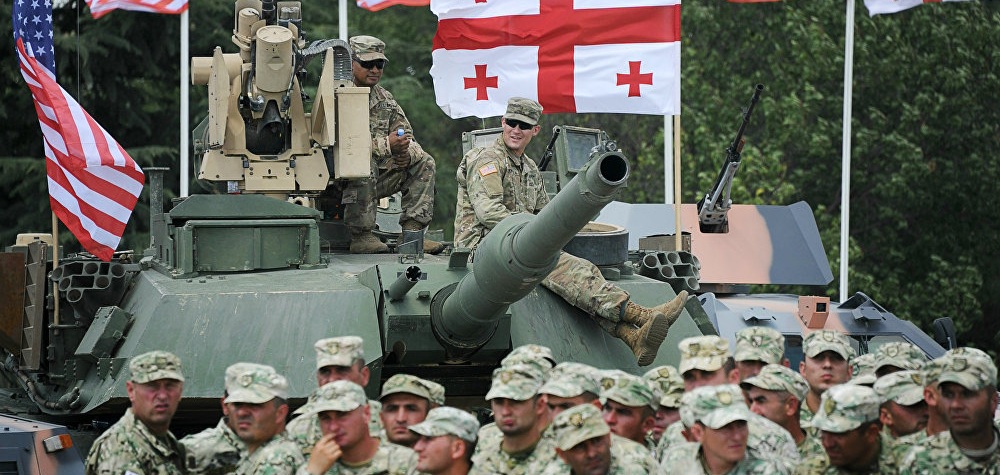Alwaght- During the visit to the US of the Georgian Defense Minister Irakli Garibashvili on Saturday, the two countries signed a three-year agreement for military and security cooperation. The Georgian minister said the priority of cooperation is given to military and security and is expected to upgrade the bilateral ties to a new level as Georgia will turn into an "independent partner" to the US moving away from its old status as the simple host of the military drills. Such an announcement was contrary to conservative policy adopted by Georgia since 2008. Caucasus and South Caucasus regions are regions of sensitivity to Russia and the US efforts to get a toehold there will bring new challenges to the region's security order.
Washington's interests in South Caucasus
After collapse of the Soviet Union, South Caucasus– a region covering Georgia, Armenia, and Azerbaijan– found special significance in the American foreign policy due to political importance and also because of its access to the Red Sea, Caspian Sea, and bordering Russia. The three countries' foreign policy, among the other near abroad countries, has the widest gap with that of Russia and this encourages the Americans to seek to influence the politics and power shift in these countries. The America Sourus Foundation's role in the Rose Revolution of Georgia in 2003 is an example of the Washington intervention in the region.
Over the past 25 years, the US repeatedly expressed commitment to support the independence of the South Caucasus states, all of whom are former Soviet republics. It promises them facilitating their partnership with the Euro-Atlantic organizations and treaties. In return, it expects them to show tendency towards the NATO. Azerbaijan has close partnership with the NATO while Armenia is the only Russia ally in South Caucasus and hosts a Russian military base. But Azerbaijan has deep geopolitical tensions with Armenia which finds itself countering a security threat. Yerevan finds itself under a threat and in isolation as it is geographically in the middle of Azerbaijan and Turkey. That causes it to seek credible security guarantees from a third party. Washington wants to develop a convergence gathering the regional countries then to give them security guarantees to make them part of its sphere of influence.
In addition to geopolitical significance, South Caucasus has huge and diverse energy sources. Washington is also worried about transfer of South Caucasus militants to areas where the US troops are stationed in military bases.
US-Georgia partnership
Georgia and Azerbaijan are the US's two countries of choice for the NATO membership. During a meeting with the Georgian foreign minister in June, the US Secretary of State Mike Pompeo said that Georgia still needs Washington support to join the NATO. Tbilisi placed a bid to join NATO since 1994. But Russia strongly opposed the idea. In 2008, Russia launched attacks on Georgian territory of South Osetia to make it clear it is not walking back from its red lines. Kremlin seeks to set up an area of influence in Osetia and Abkhazia in order to rein in Georgia and establish a security shield in the face of the American military clout there. Since the war, Georgia went more conservative in dealing with the US and Russia. In May, the Georgian president in an interview said that his country should strengthen ties with Washington but it should not make moves that provoke others, mainly Moscow. He went on the two countries do not want to build an American military base on the Georgian soil due to "sensitivity of other countries". But Georgia is not uninterested to take advantage from the American military presence to make balance with Russia.
Washington and Tbilisi signed a document in 2009 to initiate "strategic partnership." In 2015, Georgia appropriated a military base near the capital as a center for military training and assessment with the NATO. In 2018, the US at Vaziani military base initiated a center to sharpen the Georgian forces' combat readiness and improve their military training. Earlier this year, Georgia's defense ministry proposed to the US and NATO to build military infrastructure on its soil for joint war games.
Deeming Russia a threat to the US hegemony, President Donald Trump follows more aggressive policy in South Caucasus. Upon assumption of the power at the White House, he sent his Vice-president Mike Pence to Tbilisi for security cooperation talks. In 2019 budget, Washington allocated over $127 million in aids to Georgia, growing $22 million compared to the year before. According to the Department of State $275 million for developing law implementation mechanisms, closeness to the European Union, and encouraging resistance to the Russian military and economic pressures are spent in Eurasian and East Europen states. In 2019, the US government warned that it withholds aids to countries that recognize Abkhazia and South Osetia or establish diplomatic ties with them.
In 2016, The US and Georgia signed a MoU on security and military cooperation. The Americans are set to train 9 brigades of the Georgian army by 2020. Since start of Trump presidency, M-240 rifles replaced the AK-47 rifles in the Georgian army. The country also was provided by Washington anti-tank and armored vehicles. Its air force is planned to procure new generation of Stinger missiles in the near future, reports note.
Although Georgia is cautious not to provoke Russia, the US is rushing to block Moscow's sway over South Caucasus. They are not afraid to openly follow this policy to force the Russians into an erosive arms race. Such inconsiderate style of policy further provoked Russia in 2019 and caused frictions among the opposition and the allies of the Georgian president.



























